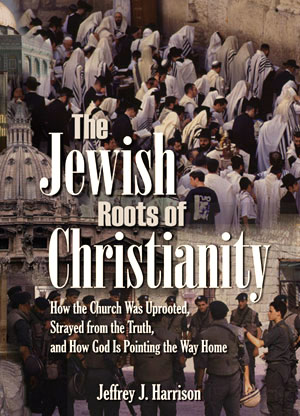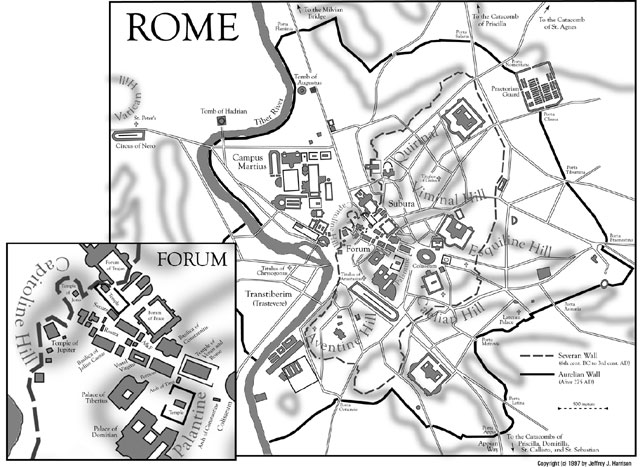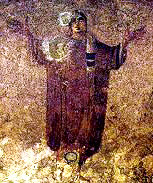The Jewish Roots of Christianity
— A Landmarks of Faith Seminar —

Lecture #2a Audio
The Gentilization of Christianity
 See notes below. (Sections in parentheses are covered in the longer form of this seminar and in the book version: available in print and on Kindle.)
See notes below. (Sections in parentheses are covered in the longer form of this seminar and in the book version: available in print and on Kindle.)Lecture #2a:
Or click here for more listening options at Internet Archive.
__________________________
Lecture #2a Notes
PAGAN ROMAN CIVILIZATION
Pagan religious rituals were a part of everyday life.
- More than 20% of the population of Rome was slaves.
- Prostitution and infanticide (killing unwanted children) were common.
- Many sought oracles from demon-possessed priests and priestesses (and others as in Acts 16:16).
Janus (January): The two-faced Roman god of beginnings.
Mars (March): The Roman god of war.
Julius Caesar (July): First emperor of Rome.
Augustus Caesar (August): Emperor of Rome when Jesus was born.
Roman Senate: Gives its name to senates in many countries today.
Roman Republic: Gives its name to many republics today (the republican form of government).
Roman Capitol: The most important temple in Rome, dedicated to Jupiter. Gives its name to the U.S. Capitol Building.
Forum: Originally the ancient market of Rome, became the center of Roman government. Source of the English word
forum,
an open discussion about a topic.
Basilica: A large, open, public building with columns used for law courts and other public activities. This type of building was later used for churches.
Rostra: The speakers’ platform in the Forum. Source of the English word rostrum
as a place for public speaking.
Palantine Hill: Location of the palace of the Roman emperor. Source of the English word palace.
Capitoline Hill: Location of the Capitol, temple of the god Jupiter.
Jupiter: Chief god of the Romans. Source of the name of the planet Jupiter. By Jove.
Juno (June): Wife and sister of Jupiter.
Colosseum: A massive sports stadium built in the 1st cent. AD by Jewish slaves with money from the First Jewish Revolt.
Latin: The language of the Roman Empire. About 50% of English words are based on Latin. Today, the Latin alphabet is used for writing most of the languages of the world.
ROMAN ATTITUDES TOWARD THE JEWS
Expulsions from Rome: Jews living in Rome were expelled from the city in 139 BC, AD 18, and AD 49.
Trastevere: A district of Rome on the other side of the Tiber river where many Jewish families lived. In New Testament times, there were more Jewish people living in Rome than in Jerusalem (40-50,000).
Jewish anti-social
behavior: They did not go to the theater, participate in sports, attend the races, or observe Roman
festivals.
Cicero (59 BC): Famous orator. Called Judaism a barbaric superstition.
Pompeius Trogus (early 1st AD): Said the ancestors of the Jews were lepers.
Horace (late first century BC): Mocked the Jews for their enthusiasm about making converts.
Those of Caesar’s household
: Believers in Jesus that worked in the palace of the emperor (Phil. 4:22).
Empress Poppaea: Wife of Nero, sympathetic to the Jewish people.
Publius Petronius: The Roman governor of Syria, sympathetic to the Jewish people.

The AD 18 expulsion from Rome was because of Jewish success in making converts: As the Jews had flocked to Rome
in great numbers and were converting many of the natives to their ways, [Emperor Tiberius] banished most of
them
(Dio, Roman History 57.18.5a).
Philo: Famous Jewish philosopher, 1st cent. AD. Who has not shown this high respect for the sacred Seventh Day by
giving rest and relaxation from labor to himself and his neighbors, freeman and slave alike
(Vita Mosis 2.20).
Josephus: There is not any city of the Greeks nor of the barbarians, nor any nation whatsoever, where our custom of
resting on the Seventh Day has not come
(Against Apion 2.39).
Seneca: Meanwhile the customs of this accursed race [the Jews] have gained such influence that they are now received
throughout all the world. The vanquished have given laws to their victors
(Augustine, De Civitate Dei 6.11).
ROMAN ATTITUDES TOWARD CHRISTIANS
Acts 18:2: And he [Paul] found a certain Jew named Aquila...having recently come from Italy with his wife Priscilla,
because Claudius had commanded all the Jews to leave Rome.
The Chrestus Expulsion (AD 49): Because the Jews at Rome caused continuous disturbances at the instigation of
Chrestus [i.e. Christus/Christ], [Emperor Claudius] expelled them from the city
(Suetonius, Twelve Caesars,
Claudius 176).
Acts 17:6: These men who have upset the world..."
Christianity was first established among the Jewish residents of the city of Rome long before any of the apostles arrived there. Paul first came eleven years after the Chrestus expulsion; Peter came after that.
Acts 24:5: ...the sect of the Nazarenes
Acts 24:14: According to the Way [Christianity] which they call a sect...
Acts 28:22: Concerning this sect, it is known to us...
Gallio: Governor (Proconsul) of southern Greece (Achaia) when Paul was in Corinth.
Acts 18:15: If there are questions about words and names and your own law, look after it yourselves; I am unwilling
to be a judge of these matters.
(Legal privileges granted by Julius Caesar to the Jewish people:
- Free exercise of religion,
- exemption from the worship of Roman gods,
- the right to live under Jewish law in Israel and other areas of Jewish population,
- the right to observe the Sabbath,
- protection of the Jewish Temple tax (Matt. 17:24),
- a reduction in taxes,
- and exemption from military duty.)
THE PERSECUTION OF NERO
Fire of Rome (AD 64): Lasted five days. More than two-thirds of the city was burned.
Persecution of Nero (AD 64): Nero blamed the Christians for the fire. Thousands were killed.
Ishmael: The Jewish High Priest. A Sadducee. Was visiting the city of Rome at the time. A guest in the palace of Poppea the Empress.
Yoma 9a (Babylonian Talmud): Mentions the fists
of the house of Ishmael.
Hebrews 10:21,23,25,35,36: ...since we have a great priest over the house of God [Jesus].... Let us hold fast the
confession of our hope without wavering...not forsaking our own assembling together.... Therefore, do not
throw away your confidence.... For you have need of endurance.
Mockery of every sort was added to their deaths. Covered with the skins of beasts, they were torn by dogs and perished,
or were nailed to crosses, or were doomed to the flames and burnt, to serve as a nightly illumination, when
daylight had expired. Nero offered his gardens for the spectacle, and was exhibiting a show in the circus, while
he mingled with the people in the dress of a charioteer or stood aloft on a chariot. Hence, even for criminals who
deserved extreme and exemplary punishment, there arose a feeling of compassion; for it was not, as it seemed,
for the public good, but to glut one man's cruelty, that they were being destroyed
(Tacitus, Annals 15.44).
Discovery: A first century AD cemetery under St. Peter’s basilica at the Vatican with Christian burials. One of these may be the burial of the apostle Peter.
DETERIORATING RELATIONSHIP OF ROMANS WITH JEWS AND CHRISTIANS
Petronius (66 AD): Mocked the Jews for worshipping a pig-god.
Martial (88 AD): Mocked the odor of the breath of women fasting on the Sabbath.
Quintilian (94 AD): Called the Jews a race which is a curse to others...
Damocritus (1st cent. AD): Accused the Jews of worshipping the golden head of an ass, and of human sacrifice.
Plutarch (early 2nd cent): considered the Sabbath a time of drunkenness.
Tacitus (early 2nd cent.): Said the Jews were descended from lepers expelled from Egypt. All their customs are perverse
and disgusting.
The Jewish Tax (fiscus Judaicus): Also collected from Gentile Christians.
Domitian's agents collected the tax on Jews with a peculiar lack of mercy; and took proceedings not only against those
who kept their Jewish origins a secret in order to avoid the tax, but against those who lived as Jews without
professing Judaism
(Suetonius, Twelve Caesars, Domitian 12).
Persecution of Domitian: For atheism and Jewish ways.
Included Clemens and Domitilla, Domitian’s cousin and
niece.

Discovery: One of the oldest Christian cemeteries in Rome, an underground catacomb, was located on Domitilla’s family property. It has Christian tombs that date back to the 2nd century AD.
Patmos: Prison island where John had the visions recorded in the book of Revelation.
1 John 3:13: Do not marvel, brethren, if the world hates you.
1 John 3:16: He laid down his life for us, and we ought to lay down our lives for the brethren.
2 John 1:1: The elder to the chosen lady and her children.
3 John 1:14: The friends greet you.
Christianity was first identified as legally separate from Judaism in the time of Trajan, which meant it had no legal rights.
Persecution of Christians by Jews made them enemies of the gospel
(Rom. 11:28).
Jewish revolts broke out in Mesopotamia, Cyrene, Egypt, and Cyprus in 115 AD. There were also anti-Jewish riots in Alexandria, Caesarea, and Antioch. In Cyrene, 220,000 were killed. In Cyprus, 240,000 were killed.
Epistle of Barnabbas (end of 1st/early 2nd cent.):
- Claims that the Law was never intended by God to be taken literally.
- Sacrifices, new moons, and sabbaths had never been intended by God (2.5-6)
- The land of milk and honey was never intended to refer to the physical land of Israel, but to the Christian life.
- Circumcision was never intended in the flesh, but the Jews were misled by an
evil angel
to take this literally. - The food restrictions were never intended literally, but only spiritually (10.9).
- The Sabbath is not intended to be observed now, he says, but only when Christ comes in the Millennium (15.8).
- The Jews erred when they built the Temple in Jerusalem, etc.
Hadrian (130’s AD): Roman Emperor. Made Judaism illegal. Also opposed Christianity and the Samaritan religion. Planned to rebuild Jerusalem as a pagan city.
Aphrodite: Roman goddess. Hadrian built a temple to her over the tomb of Christ in Jerusalem.
Tammuz: Hadrian planted a grove of trees to this pagan god over the birth cave of Jesus in Bethlehem.
Mt. Gerizim: The holy mountain of the Samaritans. Hadrian built a pagan temple here to Jupiter.
Second Revolt of the Jews, also known as the Bar Kochba Revolt (132-135).
Aelia Capitolina: Hadrian’s name for Jerusalem, from which all Jews were expelled.
ATTITUDE OF GENTILE CHRISTIANS TOWARDS THE JEWS
Apologists: Early Christian writers who defended Christianity to their fellow Romans. Wrote in the style of Roman philosophers. Based their arguments on pagan philosophy and religion, combined with ideas from the New Testament. For them, Christianity is a Greek-style mystery or philosophy revealed by Jesus.
Diognetus (2nd cent. AD): Condemns Jewish practices, but does not explain why, if they are wrong, they are commanded in the Old Testament.
Tertullian: Famous Christian writer of North Africa. Taught that the Law of Moses was abolished, that it was only temporary, and that it was carnal.
Justin Martyr (100-165): Established a Greek-style Christian school in Rome at which Christianity was taught as the
true philosophy.
Called circumcision and the Sabbath marks of shame.
Clement of Alexandria (185 AD): Taught that Christianity was the greatest philosophy, for which ancient Greek philosophy had prepared the way. Taught that Jesus couldn’t experience pleasure or pain, and didn’t eat food. Also taught transmigration (a type of reincarnation) and a form of universalism (that all will be saved in the end).
Sibylline Oracles: The recorded prophecies of pagan priestesses known as Sibyls. Sibylline-style prophecies written by Christians began to appear in the 2nd century AD. Quoted hundreds of times in the Church Fathers. Had a greater affect on Christian endtime thinking than the Book of Revelation! Sibyls can still be seen on the ceiling of the Sistine Chapel at the Vatican.